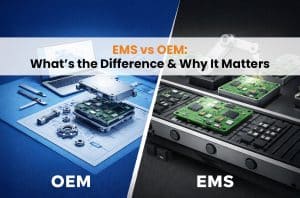In today’s technology-driven world, electronic devices play a crucial role in our daily lives. From smart phones and laptops to home appliances and automotive systems, electronics have become an integral part of our modern society. Behind the scenes, electronic manufacturing services (EMS) companies are the unsung heroes responsible for designing, manufacturing, and testing these sophisticated electronic products. In this blog post, we will explore the world of EMS and its wide-ranging applications.
Roots, as one of India’s leading Electronic manufacturing service companies, have witnessed the evolution and rapid development in the EMS industry. This blog will provide information on its development, trends, Challenges, Barriers and more.
Understanding Electronic Manufacturing Services (EMS)
Electronic Manufacturing Services (EMS) refers to the outsourcing of electronic product design, assembly, and testing to specialized companies. EMS providers offer a range of services, including printed circuit board (PCB) assembly, product prototyping, supply chain management, and even after-sales support. These companies work closely with original equipment manufacturers (OEMs) to bring electronic products from concept to market.
Applications of Electronic Manufacturing Services
Consumer Electronics: EMS plays a vital role in the production of consumer electronics such as smartphones, tablets, laptops, and gaming consoles. These devices require high-quality assembly, miniaturization, and integration of various components, which EMS companies specialize in. They help OEMs meet the demands of the ever-evolving consumer electronics market.
Medical Devices: The healthcare industry heavily relies on electronic devices for diagnosis, monitoring, and treatment. EMS companies ensure the production of reliable and compliant medical devices, adhering to strict regulations and quality standards. From patient monitors and imaging equipment to implantable devices, EMS is instrumental in advancing healthcare technology.
Automotive Electronics: Modern vehicles are equipped with a multitude of electronic systems, including engine control units, infotainment systems, and advanced driver-assistance systems (ADAS). EMS providers support automotive OEMs in designing and manufacturing these complex electronic systems, ensuring safety, reliability, and efficiency on the road.
Industrial Automation: Industrial automation relies on electronic controls, sensors, and communication systems to optimize productivity, efficiency, and safety in manufacturing processes. EMS companies contribute to the development of programmable logic controllers (PLCs), human-machine interfaces (HMIs), and other automation solutions, enabling seamless operations in factories.
Aerospace and Defense: The aerospace and defense sectors demand highly reliable and ruggedized electronic components and systems. EMS providers work closely with aerospace and defense OEMs to manufacture products that meet stringent requirements for performance, durability, and security. This includes avionics systems, communication devices, and missile guidance systems, among others.
Renewable Energy: As the world shifts toward clean energy sources, EMS companies are playing a crucial role in the development of renewable energy technologies. They assist in the production of electronic components for solar panels, wind turbines, and energy storage systems, contributing to the growth of sustainable energy solutions.
Benefits of Electronic Manufacturing Services
Partnering with EMS providers offers several advantages for OEMs:
Expertise and Specialization: EMS companies have extensive knowledge and experience in electronic design, manufacturing processes, and quality control. They bring expertise and specialization to the table, ensuring efficient production and high-quality products.
Cost Efficiency: Outsourcing manufacturing to EMS providers eliminates the need for OEMs to invest in their own manufacturing facilities and equipment. This helps reduce capital expenditure and overhead costs, resulting in improved cost efficiency.
Flexibility and Scalability: EMS companies offer flexibility in production volume, allowing OEMs to quickly scale up or down based on market demand. This agility enables faster time-to-market and the ability to adapt to changing customer requirements.
Supply Chain Management: EMS providers handle the complex task of supply chain management, including sourcing components, managing inventory, and ensuring timely delivery. This allows OEMs to focus on core competencies while relying on EMS expertise.
Conclusion
Electronic Manufacturing Services (EMS) are the backbone of the electronics industry, providing essential support to OEMs in the design, manufacturing, and testing of electronic products. From consumer electronics and healthcare devices to automotive systems and renewable energy technologies, EMS companies have a significant impact on various sectors. Their expertise, cost efficiency, and flexibility make them indispensable partners for OEMs seeking to bring innovative electronic products to the market. As technology continues to advance, the role of EMS will become even more critical in shaping the future of electronics.


